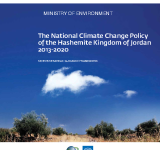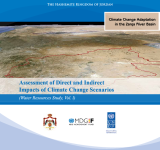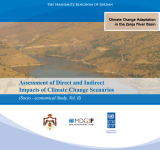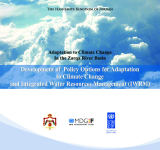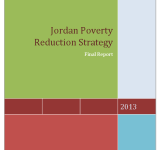Jordan faces potential serious impacts on its natural ecosystems;; on its river basins and watersheds;; on biodiversity—then cascading to impacts on food productivity;; water resources;; human health;; public infrastructure;; and human settlements. Climate change will have serious implications on the country’s efforts to eradicate poverty and realize sustainable development for current and future generations— ultimately making climate change an issue of intergenerational equity. Climate change scenarios indicate that Jordan and the Middle East could suffer from reduced agricultural productivity and water availability among other negative impacts. At the same time;; a substantial potential for cost-effective reduction of GHG emissions exists in Jordan. The Policy will provide an overarching (umbrella/high level) guidance for the Government of Jordan to implement the major climate change objectives of national priority related to adaptation and mitigation of GHG emissions
والمناخ
This document is the result of the assessment of Climate Change impacts on water resources of the Zarqa River Basin (ZRB). It details the impact on the quality and the quantity of both the surface and groundwater resources of the basin. It is hoped that this study will be a motivator for other studies in other basins of the country.
The study aims at optimizing the water allocation in the Zarqa River Basin (ZRB) through maximizing the net value added by considering the climate change scenarios developed by the team of the study. The current water allocation suffers from unmet demands. In the future;; more wastewater will be produced and more treated wastewater is expected to be used due to the increasing population and the increased connection rate and rehabilitation and expansion of the existing treatment plants;; allocating more treated wastewater for the irrigation sector would save the fresh water sources for the municipal sector. Currently the irrigation sector suffers high amounts of losses. An improvement in efficiency would contribute in saving more fresh water too. Volume One is a Water Resources Study and Volume Two is a Socio - economical Study.
The report is directed at drawing a picture of the prevailing legal and institutional frameworks of the water sector in Jordan in relation to climate change adaptation in the Zarqa River Basin (ZRB). To achieve this purpose;; three tasks were conducted;; (1) literature of pertinent documents on legislation;; administration;; regulations;; water policies and water laws were reviewed;; (2) address the gaps in the water policies in Jordan as related to climate change vulnerability;; and to raise awareness of the importance of developing climate change mitigation measures;; and (3) propose policy options for adaptation to climate change through implementation of IWRM as a tool. The objective of the revision is the assessing the appropriateness and effectiveness of the existing institutional framework regarding the climate change adaptation measures in ZRB. Combating water scarcity remains a strategic challenge that Jordan faces for augmenting its water resources.
The Government of Jordan adopted its first Poverty Alleviation Strategy in 2002 recognizing poverty as a key development problem requiring a comprehensive policy for improving the lives of the poor and socially excluded;; increasing their human capabilities;; providing them with economic opportunities and fully integrating them in the society. Considerable progress in poverty reduction has been achieved. The Government has put in place a series of social programs aimed at increasing employment opportunities;; curbing unemployment;; combating poverty and offering in-kind and cash assistance for the poor and marginalized groups within Jordanian society
